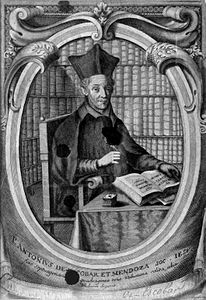
Antonio Escobar y Mendoza
Deceased Person
1589 – 1669
Who was Antonio Escobar y Mendoza?
Antonio Escobar y Mendoza was a Spanish churchman of illustrious descent.
Born in Valladolid, he was educated by the Jesuits, and at the age of fifteen took the habit of that order. He soon became a famous preacher. In addition he was a voluminous writer, and his collected works fill eighty-three volumes. His first literary efforts were Latin verses in praise of Ignatius Loyola and the Virgin Mary; but he is best known as a writer on casuistry. His principal works belong to the fields of exegesis and moral theology. Of the latter the best known are Summula casuum conscientiae; Liber theologiae moralis, and Universae theologiae moralis problemata.
The Summula was severely criticised by Blaise Pascal in the fifth and sixth of his Provincial Letters, as tending to inculcate a loose system of morality. It contains the famous maxim that purity of intention may be a justification of actions which are in themselves contrary to the moral code and to human laws; and its general tendency is to find excuses for human frailties. His doctrines were disapproved of by many Catholics, and were mildly condemned by Rome. They were also ridiculed in witty verses by Molière, Boileau and La Fontaine, and gradually the name Escobar came to signify in France any person who is adroit in making the rules of morality harmonize with his own interests, a casuist.
We need you!
Help us build the largest biographies collection on the web!
Citation
Use the citation below to add to a bibliography:
Style:MLAChicagoAPA
"Antonio Escobar y Mendoza." Biographies.net. STANDS4 LLC, 2024. Web. 9 May 2024. <https://www.biographies.net/people/en/antonio_escobar_y_mendoza>.

Discuss this Antonio Escobar y Mendoza biography with the community:
Report Comment
We're doing our best to make sure our content is useful, accurate and safe.
If by any chance you spot an inappropriate comment while navigating through our website please use this form to let us know, and we'll take care of it shortly.
Attachment
You need to be logged in to favorite.
Log In